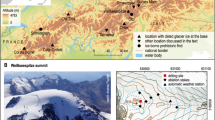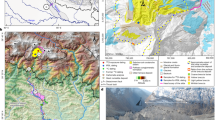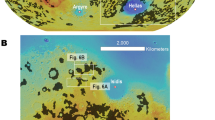Abstract
RELICT periglacial phenomena have been recorded from south-west England for more than two hundred years. Reference has been made to head, clitter, rubble drift, loessic deposits and other manifestations of mechanical rock-weathering and ablation of debris under sub-arctic conditions1, to geomorphological features which resemble actively developing tundra land-forms2 and to fossil floras with arctic or alpine characters3. But so far as has been ascertained, no account has been given of phenomena which attest to the former existence of frozen ground (tjäle) in Devon.
This is a preview of subscription content, access via your institution
Access options
Subscribe to this journal
Receive 51 print issues and online access
$199.00 per year
only $3.90 per issue
Buy this article
- Purchase on Springer Link
- Instant access to full article PDF
Prices may be subject to local taxes which are calculated during checkout
Similar content being viewed by others
References
Charlesworth, J. K., The Quaternary Era, 2, 1080 (1957). Coombe, D. E., and Frost, L. C., J. Ecol., 14, 605 (1956).
Guilcher, A., R. Géom. dyn., 1, 53 (1950). Te Punga, M. T., Biul. Peryglacjalny, 4, 331 (1956).
Heer, O., Phil. Trans. Roy. Soc., 152, 1039 (1862). Conolly, A. P., et al., ibid., B, 234, 397 (1950).
Bryan, K., Amer. J. Sci., 244, 622 (1946).
Author information
Authors and Affiliations
Rights and permissions
About this article
Cite this article
WATERS, R. Involutions and Ice-Wedges in Devon. Nature 189, 389–390 (1961). https://doi.org/10.1038/189389a0
Issue Date:
DOI: https://doi.org/10.1038/189389a0
Comments
By submitting a comment you agree to abide by our Terms and Community Guidelines. If you find something abusive or that does not comply with our terms or guidelines please flag it as inappropriate.



